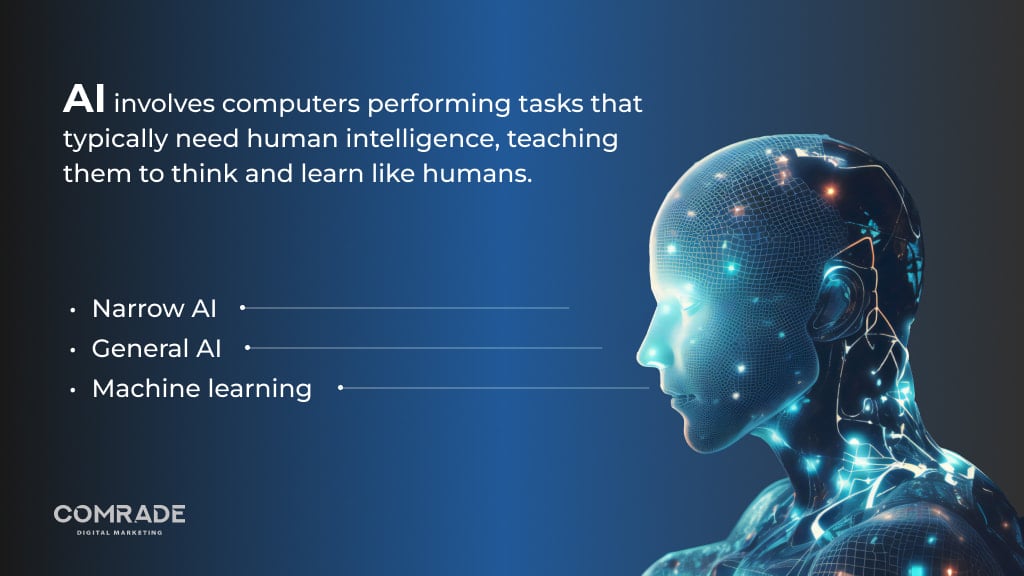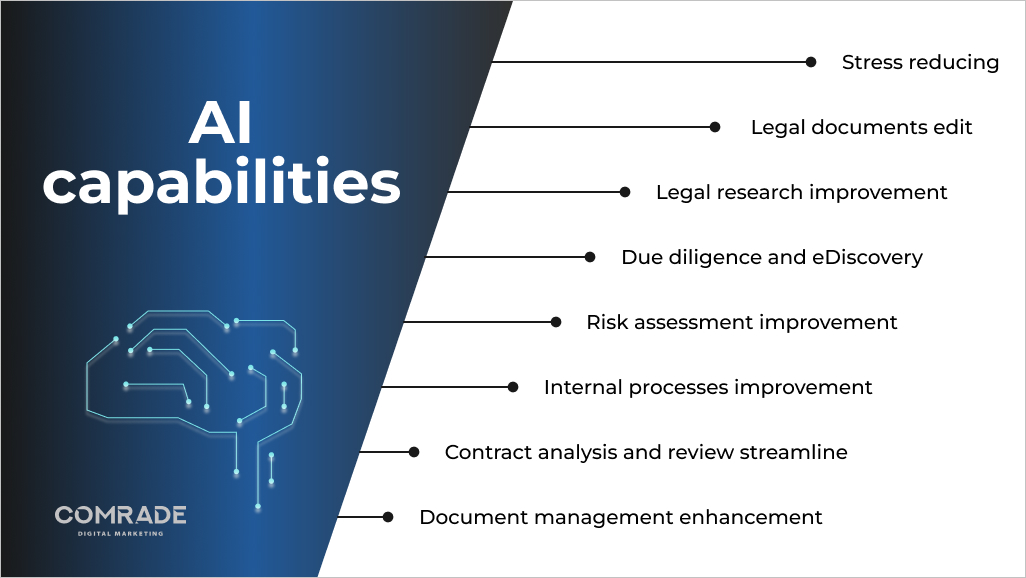We all know what’s up: AI is everywhere now. Businesses of all types are implementing AI tools for lawyers to help automate certain tasks and save time and money. Our search marketing agency, Comrade Digital Marketing, has more than a few attorney clients who use it to their benefit.
Did you know that a whopping 82% believe that ChatGPT and generative AI can be applied to legal work? Talk about embracing the future! And 51% of experts agree that ChatGPT and generative AI should indeed be applied to legal work.
So, join us on our legal AI journey as we explore how these cutting-edge technologies can help grow your legal practice, streamline your processes, and bring efficiency to the forefront.
What Is AI for Lawyers
AI, short for Artificial Intelligence, might sound like science fiction, but it’s making a real impact in the legal world. In simple terms, AI refers to computer systems designed to perform tasks that usually require human intelligence. Think of it as teaching computers to think and learn like us.

There are different types of Artificial Intelligence for lawyers, each with its own cool features. Check these out:
- Generative AI Tool: These large language models can generate creative text, translate languages, draft different legal documents, and provide insightful summaries, enhancing legal content creation and research.
- Machine Learning (ML): Legal AI that learns from data in the legal context, enabling tasks like predicting case outcomes, identifying legal risks within contracts, and classifying documents.
- Rule-Based Systems: AI guided by pre-determined rules and logic, often used in contract analysis and determining compliance with specific regulations.
- Predictive Analytics: AI analyzes historical data to uncover patterns and trends, aiding in legal research, risk assessment, and litigation strategy.
- Chatbots and Virtual Assistants: AI tools for lawyers capable of holding basic conversations with clients, providing initial consultations, scheduling appointments, and answering routine questions.
Don’t miss out on the latest advancements in legal technology! Explore the world of AI tools for lawyers and enhance your legal services.
Should Law Firms Use AI Tools for Lawyers?
AI is revolutionizing the legal industry by enhancing efficiency and practices. It automates tasks such as legal research, document analysis, and contract review through natural language processing, speeding up access to case law and saving research time. Additionally, AI-driven legal research software and legal document automation streamline operations. Digital marketing packages further expand law firms’ reach and service promotion.
AI tools for lawyers also analyze large training data sets for patterns, aiding in strategy development and offering tailored client solutions. This shift towards legal AI tools in law firms doesn’t replace lawyers but equips them with advanced resources for informed decision-making, improved client relations, and a competitive advantage, ultimately boosting productivity and outcomes.
Unlock the power of AI in lawyer marketing strategies! Dive into our insightful blog post for expert tips and strategies.
8 Benefits of Legal AI for Attorneys
Legal AI is transforming the legal industry, enabling lawyers to optimize their practices and efficiency. Coupled with effective conversion rate optimization, AI can greatly enhance a law firm’s online visibility and client acquisition. Let’s delve into the advantages of AI for attorneys.

1. Improve Your Internal Processes with Legal AI
AI tools for lawyers offer tremendous opportunities for attorneys to automate routine tasks and enhance their internal processes. By utilizing AI-powered tools for search engine marketing, you can automate repetitive tasks like contract review, legal document generation, and case management. Cognizant suggests that many law firms can achieve cost savings of up to 50% by automating routine tasks and optimizing internal processes with AI technologies.
Moreover, AI tools for lawyers can help optimize your workflow, allowing you to focus on more critical and strategic aspects of your cases. From scheduling and time tracking to client communication, AI for lawyers can be your reliable virtual assistant, freeing you up to deliver exceptional legal services to your clients.
2. Enhance Document Management with AI Tools for Lawyers
AI-driven document management systems can organize, categorize, and analyze documents with incredible efficiency. Research by Deloitte indicates that AI document management systems can reduce document review time by up to 90%, leading to significant time savings for legal professionals.
AI tools for lawyers can also assist in data extraction, making it easier to locate specific information within their countless documents. With a more streamlined and organized document management process, you can boost your productivity, stay on top of deadlines, and present a more polished image to your clients.
3. Improve Your Legal Research
Legal research is a crucial aspect of practicing law, but it can be time-consuming and resource-intensive. Analysis by LexisNexis demonstrated that AI-driven legal research platforms have a consistency rate of over 95% in identifying relevant case law across different queries and datasets, providing reliable results for legal professionals.
By using legal AI algorithms, these tools can analyze and summarize complex legal texts, providing you with relevant insights and authoritative references in a fraction of the time. This enables legal professionals to build stronger arguments, make well-informed decisions, and offer more comprehensive legal counsel to their clients.
4. Due Diligence and eDiscovery
AI is revolutionizing how law firms approach due diligence and eDiscovery. AI tools for lawyers can swiftly analyze massive amounts of structured and unstructured data, uncovering key insights within contracts, financial documents, and other materials essential to thorough due diligence.
In eDiscovery, AI tools for lawyers excel at identifying relevant information from vast datasets, pinpointing critical evidence, and streamlining document review. This automation not only saves time and reduces costs but also minimizes the risk of overlooking vital details during this legal process.
5. Streamline Contract Analysis and Review with Legal AI
For lawyers, scrutinizing contracts is a fundamental part of the job, but it doesn’t have to be a tedious and time-consuming affair. Using machine learning, AI tools for lawyers can swiftly scan through contracts, highlight essential clauses, and even suggest potential risks or concerns. The result? A seamless and efficient contract review process that empowers you to make well-informed decisions swiftly.
AI-powered tools can help ensure that contracts comply with relevant laws, regulations, and company policies. A McKinsey study found that AI tools for lawyers can enhance regulatory compliance by up to 80%. So, say goodbye to manual searching and endless reading, and embrace AI’s prowess to enhance your contract management analysis.
6. Improve Your Risk Assessment
AI-powered analytics can analyze vast amounts of data, identify trends, and assess potential outcomes, empowering you to make data-driven decisions with confidence. By leveraging AI to predict potential risks, you can provide your clients with comprehensive advice and strategies to safeguard their interests.
Legal AI algorithms can monitor regulatory changes and identify potential compliance issues, enabling law firms to proactively address legal risks and ensure adherence to industry regulations and standards.
7. Draft and Edit Legal Documents with AI Tools for Lawyers
With the power of Artificial Intelligence for lawyers, you can revolutionize the way they draft and edit legal documents. Legal AI tools can analyze vast amounts of legal data, helping lawyers draft contracts, pleadings, and other documents more efficiently and accurately. These AI systems can quickly identify relevant case laws, precedents, and statutes, saving countless hours of research time.
Moreover, AI’s natural language processing ensures clear, legally precise documents clients understand. This boosts lawyer productivity, reduces errors, and enhances the quality of legal services.
8. Make the Life of Your Legal Professionals Less Stressful
The legal profession is notorious for its demanding workload and high-stress environment. However, AI for attorneys can be a huge help in reducing stress levels.
AI-enabled tools can handle routine tasks such as document review, contract analysis, and legal research, allowing lawyers to focus on more complex and strategic aspects of their cases. This not only streamlines workflows but also helps prevent burnout among legal professionals.
Additionally, AI tools for lawyers can facilitate better time management, scheduling, and deadline tracking, ensuring that lawyers stay organized and efficient. By incorporating legal AI into their practice, attorneys can create a healthier work-life balance, leading to more satisfied and motivated legal teams that can provide exceptional service to their clients.
If you want to learn more about how AI can boost your law firm’s business, ask our specialists at Comrade Digital Marketing Agency. Schedule a free consultation.
Will AI Tools For Lawyers Replace Attorneys?
We’ve all seen the movies and shows and even read the recent articles. Wondering if AI will ever replace lawyers? AI has certainly transformed various industries, and the legal world is no exception. According to a recent study by Deloitte, around 39% of legal tasks could be automated by AI, potentially revolutionizing how lawyers work.
AI complements rather than replaces lawyers’ expertise. It streamlines tasks like legal research, contract analysis, and document review, enhancing efficiency and client services. However, AI tools for lawyers cannot replace the nuanced thinking, experience, empathy, wisdom, and problem-solving skills of attorneys. Rest assured, your jobs are secure!
Legal AI Can Benefit Your Clients

You might be wondering, “Can AI really help my legal clients?” The answer is a resounding yes. AI has the potential to revolutionize the legal industry, offering numerous benefits to your clients.
- Speed and efficiency: AI tools for lawyers can process vast amounts of legal data in a fraction of the time it would take a human. This means quicker research, analysis, and case preparation, saving your clients precious time and money.
- Accurate legal research: AI-driven research tools can swiftly sift through vast legal databases to find relevant cases, statutes, and precedents. With improved accuracy, you can provide your clients with stronger legal arguments and better outcomes.
- Enhanced document review: Legal AI document review systems can streamline the process of reviewing contracts and legal documents. This helps catch crucial details and reduces the risk of missing critical information.
- Predictive analytics: Legal AI algorithms can analyze past case outcomes, enabling you to predict potential legal scenarios. By having insights into possible outcomes, you can better advise your clients on the best course of action.
- 24/7 accessibility: AI-powered chatbots and virtual assistants allow your clients to get quick answers to their legal questions at any time, providing them with a better overall experience.
Incorporating AI tools for lawyers into your legal practice can undoubtedly benefit your clients, empowering you to provide more efficient, accurate, and personalized legal services.
Legal Ethics of Using AI Tools for Lawyers
Legal AI presents promising opportunities for law firms to enhance their practices, but it also raises critical ethical considerations that law firms must address, particularly concerning potential bias. As AI relies on human-generated data to generate outputs and predictions, it inherits the biases present in that data. For instance, if historical legal decisions were influenced by unfair biases, AI tools employing machine learning could inadvertently perpetuate these biases.
Scrutiny and validation of AI algorithms can help mitigate bias risks. Moreover, legal professionals should continuously assess and update AI systems to ensure fairness and impartiality in their decision-making processes.
Stay ahead of the competition with cutting-edge digital marketing for law firms. Check our expert insights.
Other Considerations of Legal AI for Law Firms
Law firms are increasingly adopting artificial intelligence to improve their operations, focusing on benefits while ensuring ethical standards and addressing concerns. This overview highlights key considerations for integrating AI into legal practices.
ABA Rules
Integrating AI tools into law firms offers significant benefits but requires careful consideration, especially regarding ethical and professional standards. According to the ABA Model Rule of Professional Conduct 1.1, lawyers must maintain competent representation, suggesting a balanced approach to adopting AI. Despite AI’s advantages, it cannot replace the essential role of human lawyers.
With 37 states adopting technical competence rules, staying informed about AI’s potential risks and benefits is crucial for legal professionals. Moreover, ensuring the security of privileged or confidential data used by AI tools for lawyers is paramount to protect client information.
Looking ahead, while legal AI may streamline tasks and potentially reduce staff needs, it won’t eliminate the need for legal professionals. Early adopters of AI could gain a competitive advantage. Staying updated on AI advancements and being prepared to adapt will be key to leveraging technology effectively and maintaining a leading position in the legal sector.
Data Privacy
When incorporating AI tools into your law firm, prioritizing client data privacy is essential. Given AI’s reliance on data, it’s vital to carefully control the information it accesses to prevent accidental exposure of confidential client details. Select AI vendors with strong data protection commitments to avoid such risks.
With careful selection and oversight, using AI can boost efficiency and process streamlining in your practice, all while safeguarding your clients’ privacy.
Training and Education
Training and education play a crucial role in fostering the responsible integration of AI in law firms. While not every lawyer needs to be an AI expert, having a basic understanding of how AI tools function is essential. This knowledge empowers lawyers to utilize legal AI responsibly and recognize any ethical or privacy issues that might arise.
By familiarizing themselves with AI technologies, lawyers can better vet, implement, and use these tools in their practice. This enables them to make informed decisions on when and how to incorporate AI effectively.

Implement Artificial Intelligence for the Benefit of Your Law Firm
AI tools for lawyers are revolutionizing the legal landscape, offering benefits to grow your practice. From automating tasks to lightning-fast legal research, it boosts efficiency. Embrace this technology to stay competitive, enhance client experiences, and expand your business.
At Comrade Digital Marketing, we specialize in law firm SEO services and leveraging AI for success. Our experts tailor legal AI solutions to your needs for seamless integration and maximum impact. Don’t miss out on AI’s potential. Contact us today to unlock its benefits and elevate your legal practice!

